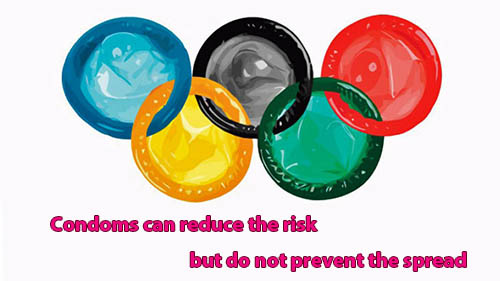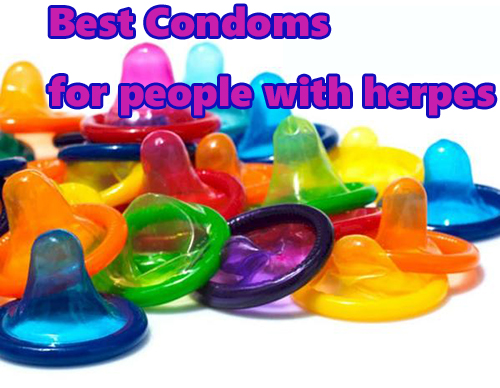When consistently used, condoms can be highly effective at preventing many STDs, such as gonorrhea, chlamydia, and even HIV. This is because these STDs are only transmitted via bodily fluids.
Some people believe the same is true for herpes. This is incorrect.

Herpes isn’t spread through bodily fluids, it is spread through direct skin-to-skin contact. Herpes can be transmitted by touching the skin of someone else with herpes. This includes kissing someone with a cold sore, oral, anal, and vaginal sex.Therefore, while condoms can reduce the risk of transmission, they can not prevent it entirely.
Why don’t condoms prevent herpes?
Unlike other STDs, herpes is transmitted via direct skin-to-skin contact. Condoms don’t cover the entire areas of the skin that could be affected. Areas such as the penile shaft, vulva, thighs, and buttocks are not protected by condoms, so herpes could still be spread to these areas.
How effective are condoms at reducing the risk of herpes tranmission?
Although herpes can’t be entirely prevented with condom use, studies say condoms can reduce the risk of transmission by about 30% to 50%. This is according to a 2009 study by E. Martin in the Archives of Internal Medicine.
This study examined the transmission rates of HSV-2 in 5,000 people. Subjects that used condoms one-hundred-percent of the time had a thirty-percent lower risk of infection. This was just as true for both female and male partners.
Can you contract herpes with a condom? Yes, but your risk will be lower than without one.
The protective effect of condoms was not as large as it is with other STDs, but a 30% reduction in HSV-2 transmission can have a huge benefit for both individuals and the public health impact at the population level.
Best condoms for people with herpes

According to laboratory studies, the herpes virus can not pass through latex condoms. As long as they are properly used, they reduce your risk of contracting or spreading herpes.Non-latex polyurethane condoms can break up to five times more often, but even latex can’t completely guarantee protection.
Many people with herpes will find that the friction from sex can trigger an outbreak. Therefore, using a water-based lubricant is recommended as it can help reduce friction.
It is also recommended to stay away from condoms containing spermicide. Nonoxynol-9, the ingredient in spermicide, can irritate the mucous membranes, such as the inner lining of the vagina. Also, oil-based lubricants can weaken latex, putting the condom at a bigger risk of breaking. Luckily, even when the friction from intercourse triggers symptoms, it won’t cause an outbreak every time.
You could also use the FC2 female condom or a dental dam. This provides extra protection and men may find it more comfortable.
You need protection during oral sex as well, but condoms during fellatio and dental dams during cunnilingus can help.
Always wear the right size condom
There are three different condom sizes. Don’t believe the myth that one-size-fits-all. Using the wrong size condom can lead to breaking.

Here are three easy ways to find the best size condom for you:
Measure the circumference of your penis.
Use a chart to find the best matching condom.
Pick the condom that best matches you, along with your preferred style and brand.
Hate condoms? Find other people with the herpes too
Men seem to have a complicated relationship with condoms. If it weren’t for condoms, they would have a lot less sex. With them, many find sex to be less enjoyable. A lot of people aren’t fans, only nineteen-percent of women between the ages of 20-44 use them every time they have sex. If two partners have the same type of herpes, they can have a more free sexual relationship. It wouldn’t be necessary to use condoms and dental dams.
Patients with HSV-1 or HSV-2 are immune to getting a new infection of the same virus anywhere on the body. For example, if both partners have oral HSV-1, it is unlikely they will infect each other’s genitals.
Many patients actively seek a partner with the same type of herpes, so they don’t have to worry about passing on the virus. Dating sites for people with herpes exist to help you meet new partners with the same strain of herpes. They have been around for as long as other dating sites.
Combined use of valtrex and condoms reduce risk more
The creators of Valtrex, an antiviral drug, have done a study on the management of herpes outbreaks and transmission rates. They found that condoms help reduce exposure to the virus. According to their study, these are the transmission rates per year of regular sex:
When partners avoid sex during an outbreak, they have a four-percent chance of transmission from female to male, and an eight-percent chance of transmission male to female.
When partners use condoms or antiviral medication, there is a two-percent risk female to male and a four-percent risk of male per female.
When partners use both condoms and antiviral medications, there is a one-percent chance female to male and a two-percent chance male-to-female.
The usage of condom in a long term relationships with herpes
Whether or not condoms are needed in a long-term, monogamous relationship is a personal decision only the couple can make. Sometimes, Discordant couples will want to stop using condoms for whatever reason, like when they’re trying to conceive or just don’t prefer condoms and use other methods of birth control.
Over time, many people find that the importance of a herpes infection goes down over time. Therefore, they may find condoms to be irrelevant if that is the only reason for condom use.
You may or your partners may wear condoms for casual, non-monogamous sex. You may consider a good thing, even though you or your sex partner may prefer the feeling without condoms. You may minimize risk of passing herpes around . Not just HSV, but any STIs.
For more guidance on sex life after herpes, see the articles:
Everything you need to know about sex after herpes
Worry of possible herpes transmission, how to get over it
When is herpes no longer contagious
What is my risk of spreading herpes? Herpes transmission rates breakdown
How do I stop my partner from catching herpes?
